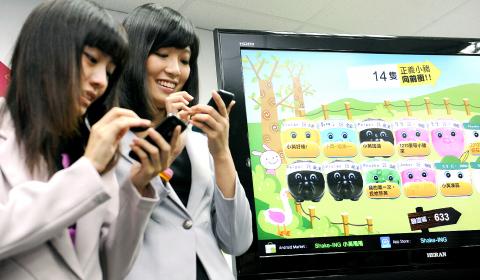The Democratic Progressive Party (DPP) is gearing up for a very busy Saturday because it will be “homecoming day” for the tens of thousands of piggy banks — the culmination of its much-publicized “three little pigs” fundraising campaign — and the vice presidential debate.
Supporters in Taipei and New Taipei City (新北市) will be able to return the piggy banks the party has distributed nationwide in a festival-like event held on Ketagalan Boulevard from 10am to 12pm, which coincides with the worldwide celebration of Human Rights Day, DPP spokesperson Lin Chun-hsien (林俊憲) told a press conference yesterday.
Similar events will also be organized by the campaign headquarters of DPP presidential candidate Tsai Ing-wen (蔡英文) in cities and counties across the country, he said.

Photo: George Tsorng, Taipei Times
The DPP launched the campaign as a countermeasure after the Control Yuan said in October that it would launch an investigation into the party’s acceptance of three piggy banks donated by children, because the Political Donations Act (政治獻金法) states that only those eligible to vote are -allowed to make political donations.
Since then, the party had distributed more than 200,000 piggy banks nationwide and designated Saturday as their homecoming day.
The DPP would like to make the gathering more like a festival for people of all ages than a campaign event, which is why there will be a magic show, singing and dance programs, Lin said, adding that the party “basically views the fundraising campaign as a way for its supporters to actively participate in the election.”
In that spirit, the party yesterday announced the launch of an interactive application for mobile phone users, which they can use on Saturday. The application, named “Shake-ing,” for both Android and Apple’s iOS systems, allows users to type messages on their mobile phones and send them to an interactive TV screen placed on Ketagalan Boulevard.
Details of the events, including whether the returned piggy banks will be lined up in certain formations, are still being discussed, Lin said.
The DPP campaign office has also been gearing up for the vice presidential debate between DPP candidate Su Jia-chyuan (蘇嘉全) and his counterparts — Premier Wu Den-yih (吳敦義) of the Chinese Nationalist Party (KMT) and Lin Ruey-shiung (林瑞雄) of the People First Party.
Su has conducted an extensive review of the DPP’s 10-year policy guideline, as well as the debate questions and statistics prepared by the campaign staff, DPP spokesperson Chen Chi-mai (陳其邁) said.
Chen did not give an direct answer when asked whether Wu would be Su’s primary target in the debate — the second of three nationally televised debates between the presidential tickets — but said Wu was an opponent who could not be underestimated because the premier “has long been known as a rhetorician.”
Su is “somewhat at a disadvantage against someone who described a mafia member as a ‘reborn person’ and said the person who invented the furlough deserved a Nobel Prize,” Chen said.
The DPP does expect its opponents, the KMT in particular, to attack Su on the farmhouse controversy, Chen said in response to a reporter’s question on the party’s “game plan” for the debate, but said bringing the issue up would not necessarily benefit the KMT.
“Many KMT members own farmhouses as well. The KMT should prepare for a backlash if it wants to bring this up,” Chen said.

Taipei has once again made it to the top 100 in Oxford Economics’ Global Cities Index 2025 report, moving up five places from last year to 60. The annual index, which was published last month, evaluated 1,000 of the most populated metropolises based on five indices — economics, human capital, quality of life, environment and governance. New York maintained its top spot this year, placing first in the economics index thanks to the strength of its vibrant financial industry and economic stability. Taipei ranked 263rd in economics, 44th in human capital, 15th in quality of life, 284th for environment and 75th in governance,

Greenpeace yesterday said that it is to appeal a decision last month by the Taipei High Administrative Court to dismiss its 2021 lawsuit against the Ministry of Economic Affairs over “loose” regulations governing major corporate electricity consumers. The climate-related lawsuit — the first of its kind in Taiwan — sought to require the government to enforce higher green energy thresholds on major corporations to reduce emissions in light of climate change and an uptick in extreme weather. The suit, filed by Greenpeace East Asia, the Environmental Jurists Association and four individual plaintiffs, was dismissed on May 8 following four years of litigation. The

A former officer in China’s People’s Liberation Army (PLA) who witnessed the aftermath of the 1989 Tiananmen Square massacre has warned that Taiwan could face a similar fate if China attempts to unify the country by force. Li Xiaoming (李曉明), who was deployed to Beijing as a junior officer during the crackdown, said Taiwanese people should study the massacre carefully, because it offers a glimpse of what Beijing is willing to do to suppress dissent. “What happened in Tiananmen Square could happen in Taiwan too,” Li told CNA in a May 22 interview, ahead of the massacre’s 36th anniversary. “If Taiwanese students or

The New Taipei City Government would assist relatives of those killed or injured in last month’s car-ramming incident in Sansia District (三峽) to secure compensation, Mayor Hou You-yi (侯友宜) said yesterday, two days after the driver died in a hospital. “The city government will do its best to help the relatives of the car crash incident seek compensation,” Hou said. The mayor also said that the city’s Legal Affairs, Education and Social Welfare departments have established a joint mechanism to “provide coordinated assistance” to victims and their families. Three people were killed and 12 injured when a car plowed into schoolchildren and their